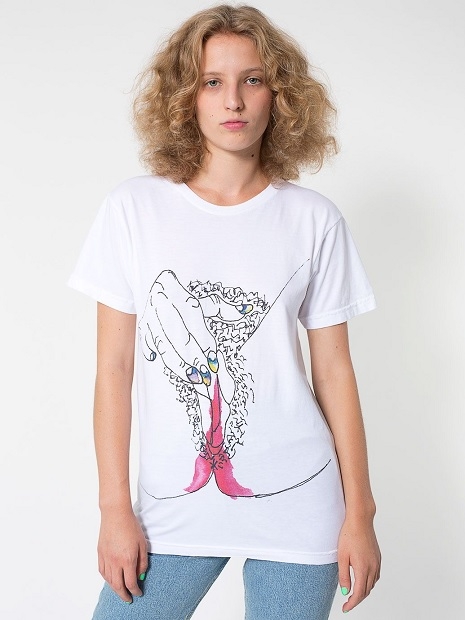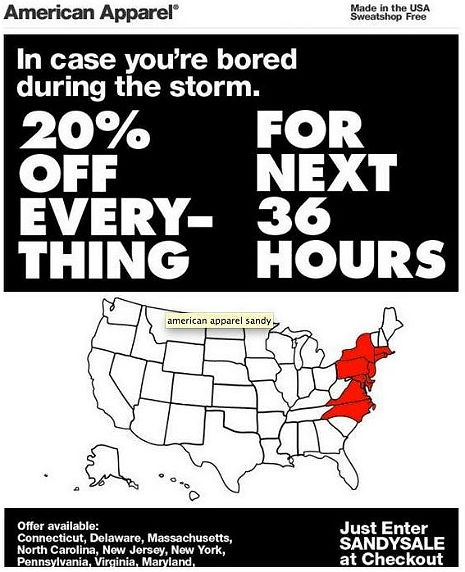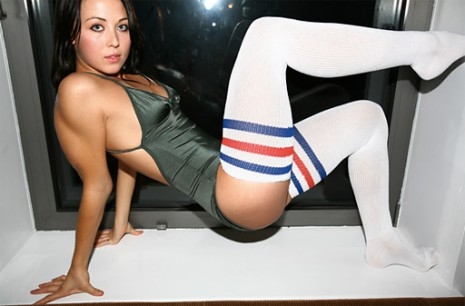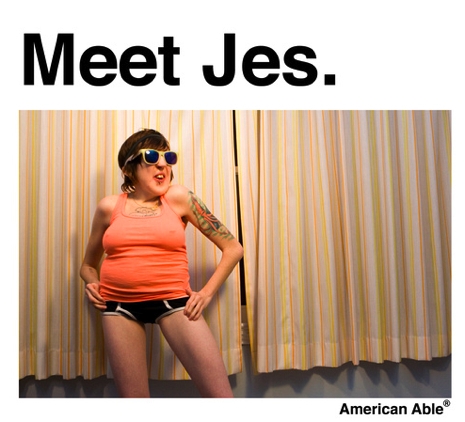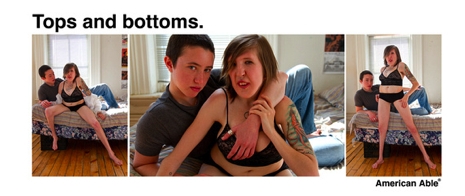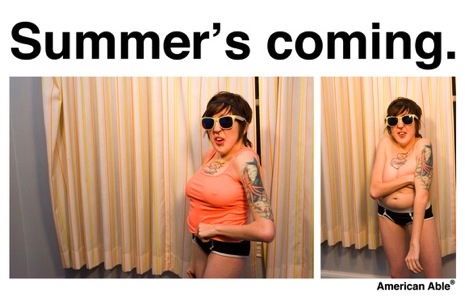
You might have seen the name Nancy Upton trending online in the last few days. After taking offence at the language in a recent talent-hunt campaign by American Apparel (a company whose image is already a source of much controversy, and who are looking for a plus-size model to advertise their new range), Nancy decided to do some satirical beauty shots of herself sexily consuming food and enter them into the contest. Well, the photos came out very well and have proved wildly popular with the public, who have voted Nancy into first place in the competition (even though she has stated that she would not accept the prize if the judges chose her to win).
All in all this is a pretty awesome story, which touches on female sexual empowerment, body image, sexist corporate branding and the acceptability of sizeism within the mainstream. I sent Nancy some brief questions for Dangerous Minds, and she was kind enough to answer them in some detail:
How did you feel about American Apparel before their “plus size” competition? What was it about this particular campaign that made you want to enter?
I feel like they’ve always gone above and beyond other companies in objectifying women. Basically it was the fact that they were trying to take advantage of a new market but make it seem like they were doing people a favor. I answered this a bit with my Daily Beast article.
“The company was co-opting the mantra of plus-size empowerment and glazing it with its unmistakable brand of female objectification. The puns, the insulting, giggly tones, and the over-used euphemisms for fat that were scattered throughout the campaign’s solicitation began to crystalize an opinion in my mind.
...
American Apparel was going to try to use one fat girl as a symbol of apology and acceptance to a demographic it had long insisted on ignoring, while simultaneously having that girl (and a thousand other girls) shill their products.”
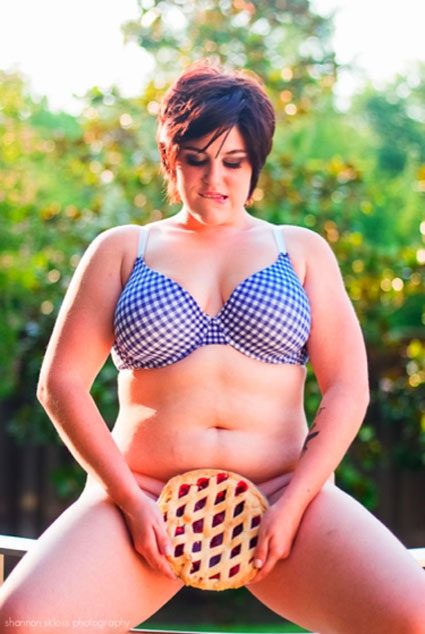
What’s your reaction to being voted no. 1 by the public?
Complete and utter shock. I never expected to actually be accepted into the contest, and I certainly never expected for people (other than friends who knew what I was doing and why I was doing it) to want me to win.
You’ve taken a bit of flack for supposedly insulting large women with the pics - how do you respond to that?
It’s actually very upsetting for me to hear from women that they feel insulted by what I did. I feel like, being a plus-sized woman myself, it should be very apparent that the photos are done to mock people who are the ones judging overweight men and women. Also, that they were done in the spirit of silly shenanigans and having fun being yourself. I feel like watching a plus-sized model get brutally airbrushed or only shot from one specific, slimming angle for an ad campaign is way more insulting. It’s interesting that by insulting a company that has a history of negativity towards women, I’ve managed to insult the same women the company marginalizes.
You have already said that if you do win you wouldn’t accept the prize - but wouldn’t it be better if you did?
Would it be better? I’m not sure. I wouldn’t appear for American Apparel because I disagree with their business practices, specifically their system of advertising. I feel like putting your face on a product or brand you can’t actually get behind is pretty gross. I’m also not sure it would send a great message. I feel like I’ve had an opportunity to make a statement about standing up (or at least satirizing) for what you believe in, and if I turned around and accepted a job from AA, that statement would be negated to a degree.
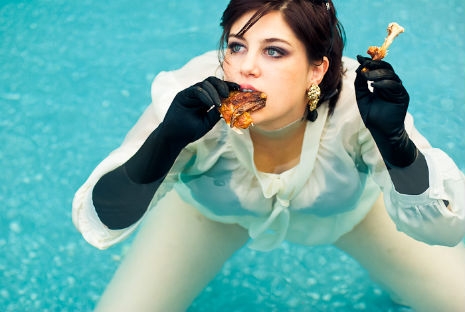
Do you have any favourite other models in the comp you think should win?
I’m not going to play favorites, but I definitely think the person chosen should ACTUALLY be unknown, especially since there’s no monetary compensation. Some of the women in the competition not only had modeling experience, but are actually signed with agencies. I’ve always been under the impression that once you have representation, you should avoid contests and stunts like this. But what the hell do I know about the world of modeling?
What do you think as to how large people are treated in mainstream culture and fashion in general, and is there anything anyone can do to affect this?
I feel like it’s a dialogue/presence that is always in a flux between shrinking and expanding. For every “fat best friend” throw away character on television, we get one who is brilliantly written and portrayed. Increasingly we see different shapes and looks being incorporated into major ad campaigns and runway work. Are large people treated well across the board? No. Has their level of representation and respect grown from where it was 10 years ago? Yes.
I think people are becoming more and more outspoken about the role of the plus-sized model in fashion, as well as in other aspects of entertainment and art. If we continue to keep those lines of communication open and express our desires directly and dynamically, change will happen.
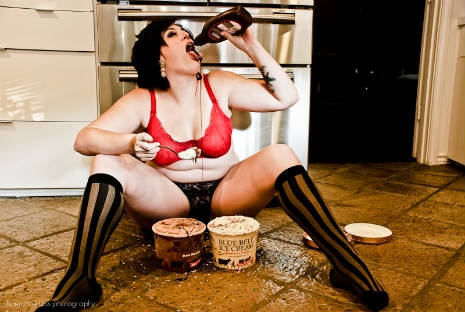
Are there any designers/labels/outlets you think DO respect plus size people?
I think some designers have cuts that are more generous or have become more generous as time has gone on. Diane Von Furstenberg, for example. I believe they go up to a 14 now, as does Kate Spade, which is interesting considering their clothing line isn’t even the company’s main selling point.
I’m a big fan of the Dove campaigns. They’re very natural and don’t feel patronizing or cheap. They’re honest, simple and encourage individuality. The Gentlewoman had a great article on Adele earlier this year, and I’m a big fan of the way they profile strong, interesting women in their magazine. Target has a great selection of sizes and, I swear, every time I walk in there, the clothes are better and better.
And finally the photographs are beautiful - can you tell us more about the photographer?
Shannon Skloss, the magnificent. She has a website that will be launching soon, but for now you can find her business page on Facebook. She’s incredibly funny, vibrant and talented. We had so much fun on the shoot, and her work is just outstanding. We were introduced through a mutual friend when I needed some headshots done a few months ago, and I’m so glad it worked out that way.
Voting has now closed on the American Apparel “Next Big Thing” campaign, though we await with interest any kind of statement from the company. Shannon Skloss’ Facebook photography page is here.
Posted by Niall O'Conghaile
|
09.11.2011
02:25 pm
|








